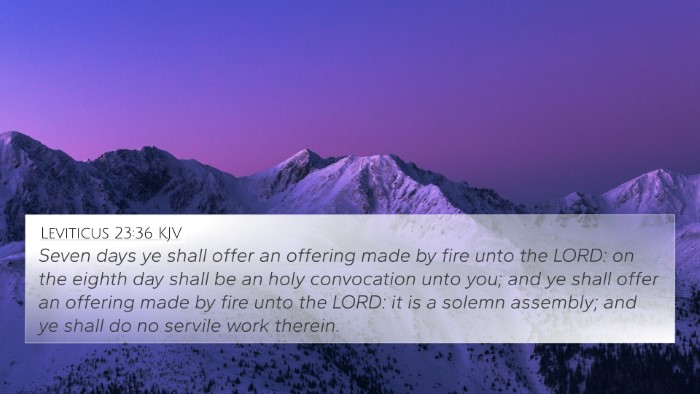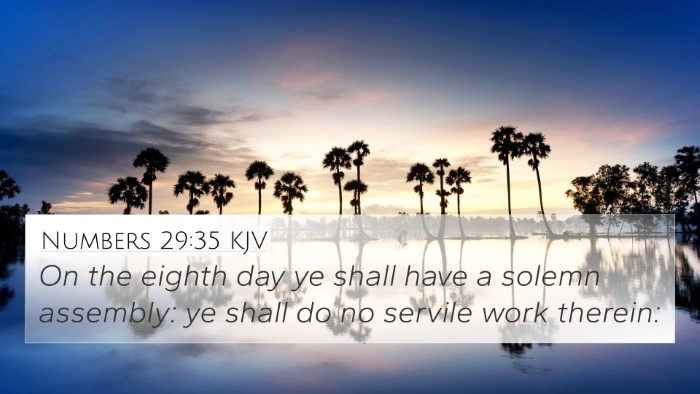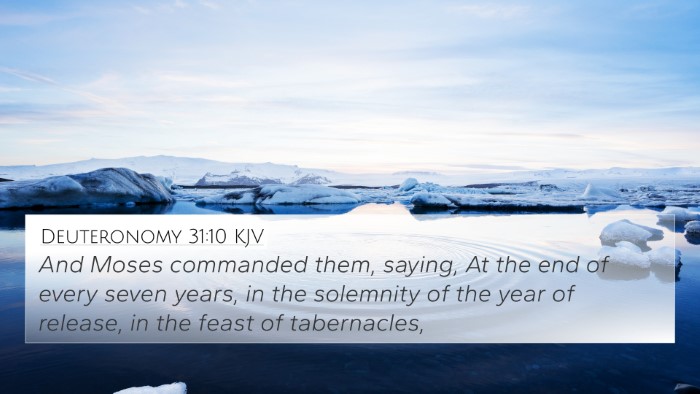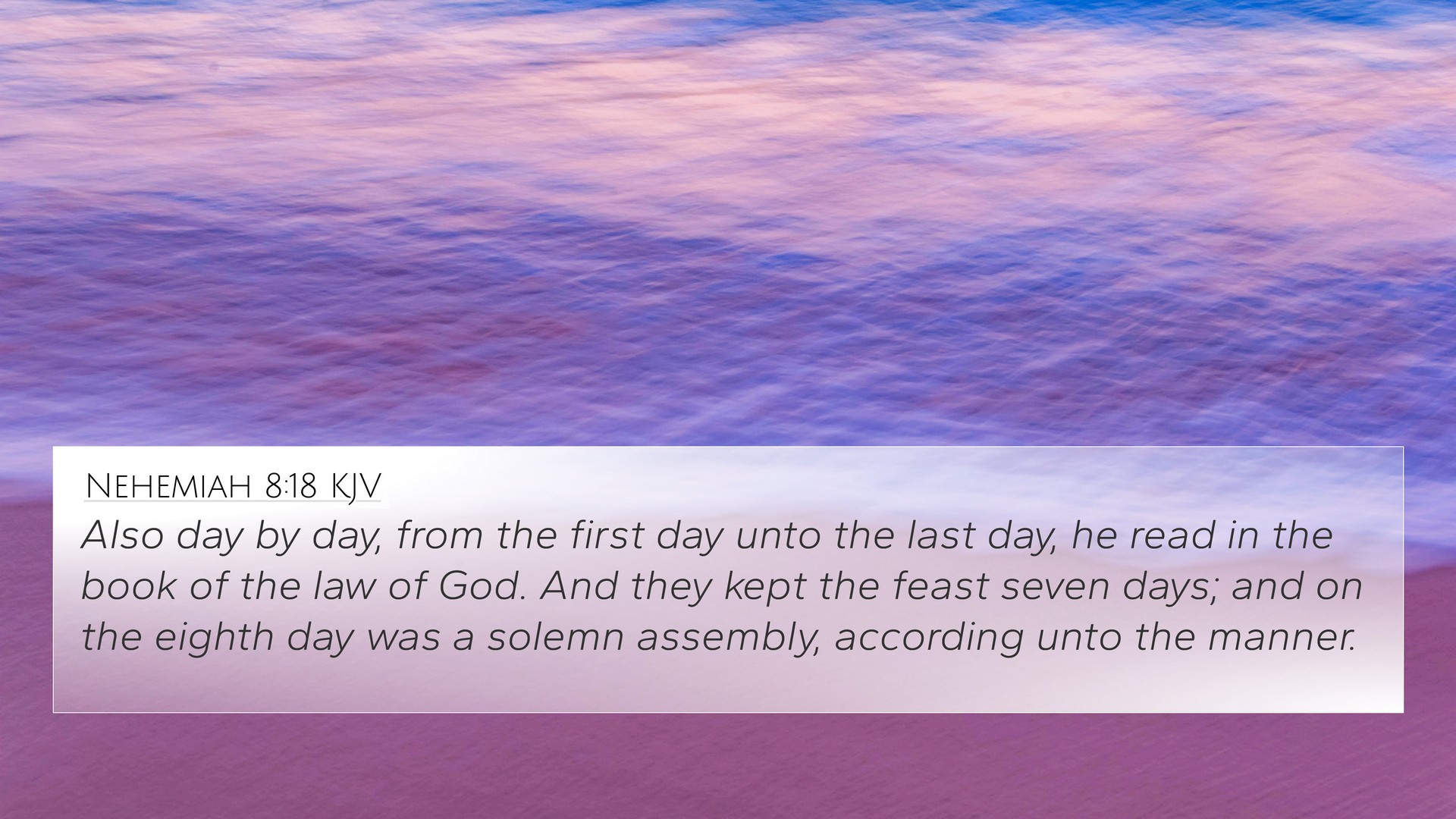Old Testament
Genesis Exodus Leviticus Numbers Deuteronomy Joshua Judges Ruth 1 Samuel 2 Samuel 1 Kings 2 Kings 1 Chronicles 2 Chronicles Ezra Nehemiah Esther Job Psalms Proverbs Ecclesiastes Song of Solomon Isaiah Jeremiah Lamentations Ezekiel Daniel Hosea Joel Amos Obadiah Jonah Micah Nahum Habakkuk Zephaniah Haggai Zechariah MalachiNehemiah 8:18 Similar Verses
Nehemiah 8:18 Cross References
Also day by day, from the first day unto the last day, he read in the book of the law of God. And they kept the feast seven days; and on the eighth day was a solemn assembly, according unto the manner.
Uncover the Rich Themes and Topics of This Bible Verse
Listed below are the Bible themes associated with Nehemiah 8:18. We invite you to explore each theme to gain deeper insights into the Scriptures.
Nehemiah 8:18 Cross Reference Verses
This section features a detailed cross-reference designed to enrich your understanding of the Scriptures. Below, you will find carefully selected verses that echo the themes and teachings related to Nehemiah 8:18 KJV. Click on any image to explore detailed analyses of related Bible verses and uncover deeper theological insights.

Leviticus 23:36 (KJV) »
Seven days ye shall offer an offering made by fire unto the LORD: on the eighth day shall be an holy convocation unto you; and ye shall offer an offering made by fire unto the LORD: it is a solemn assembly; and ye shall do no servile work therein.

Numbers 29:35 (KJV) »
On the eighth day ye shall have a solemn assembly: ye shall do no servile work therein:

Deuteronomy 31:10 (KJV) »
And Moses commanded them, saying, At the end of every seven years, in the solemnity of the year of release, in the feast of tabernacles,

John 7:37 (KJV) »
In the last day, that great day of the feast, Jesus stood and cried, saying, If any man thirst, let him come unto me, and drink.
Nehemiah 8:18 Verse Analysis and Similar Verses
Understanding Nehemiah 8:18
Nehemiah 8:18 states: "Also day by day, from the first day unto the last day, he read in the book of the law of God: and they kept the feast seven days; and on the eighth day was a solemn assembly, according unto the manner." This verse holds significant meaning within the context of scripture and highlights the importance of scripture reading and communal worship.
Contextual Analysis
In order to fully appreciate the meaning of Nehemiah 8:18, we should consider the historical and spiritual context:
- Historical Context: Nehemiah returns to Jerusalem after the Babylonian exile to rebuild the city and its walls. This verse signifies the people's adherence to God's laws and the reestablishment of their communal identity.
- Spiritual Reformation: This reading of the law signifies a collective return to righteousness and a commitment to spiritual practices, which had been neglected during their captivity.
Theological Implications
Nehemiah 8:18 serves to remind believers of the significance of God's Word and the importance of its regular reading and application in daily life.
- Communal Engagement: The people gathered to listen to the reading of the Scriptures, which signifies the importance of community in spiritual growth and understanding.
- Celebration of God’s Laws: Their observance of the feast indicated joy and reverence towards God's commandments, a theme recurrent throughout Scripture.
Commentary Insights
Various public domain commentaries provide valuable insights into Nehemiah 8:18:
- Matthew Henry: Henry emphasizes the joy derived from learning God’s laws and the communal aspect of worship, which brings the people closer together as they rejoice in God’s presence.
- Albert Barnes: Barnes draws attention to the obedience of the Israelites in maintaining their feasts and the significance of regular Scripture reading as an act of devotion and instruction.
- Adam Clarke: Clarke discusses the importance of keeping a solemn assembly to further solidify the commitment to God’s Word and the impact it had on the people’s lives during their return from exile.
Bible Verse Cross-References
Nehemiah 8:18 can be cross-referenced with the following scripture passages that illuminate the themes present in this verse:
- Exodus 12:14: Discusses the observance of the Passover, highlighting the importance of remembering and celebrating God’s acts.
- Leviticus 23:33-43: Details the Feast of Tabernacles, paralleling the celebration in Nehemiah's time with God's commands for feasts.
- Joshua 8:34-35: Mentions the reading of God’s Law, emphasizing the continuity of God’s Word through generations.
- 2 Chronicles 30:1: Describes another communal gathering for the celebration of Passover, illustrating the importance of collective worship.
- Acts 2:46-47: Relates the early church's practice of meeting together regularly, drawing a direct connection to communal worship and joy.
- Romans 15:4: Alludes to the significance of Scriptures for teaching and hope, emphasizing the relevance of God’s laws.
- 1 Thessalonians 5:27: Reflects the continuity of scriptural reading in the Christian community, paralleling Nehemiah’s practices.
Thematic Connections
The themes emerging from Nehemiah 8:18 include:
- Importance of Scripture: The centrality of God's Word in the life of the community.
- Joy in Worship: Delight in gathering to honor God and His decrees.
- Faith and Obedience: The understanding that true joy comes from following God's commands.
Application for Today
Contemporary believers can learn from Nehemiah 8:18 in various ways:
- Commitment to Bible Study: Encouraging regular reading and studying of scriptures within community settings.
- Celebration of Faith: Creating opportunities for communal worship that mirrors biblical feasts and unity.
- Embracing God’s Word: Learning to draw joy from hearing and understanding scripture as lived out in the community.
Conclusion
Nehemiah 8:18 stands as a powerful reminder of the importance of God's Word, community worship, and the joy that comes from living in accordance with divine instruction. Through cross-referencing this verse with others, believers can deepen their understanding and strengthen their commitment to scriptural truths.


